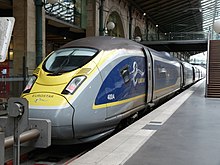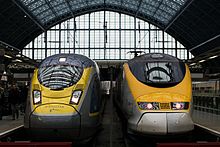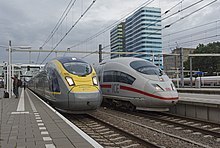| British Rail Class 374 Eurostar e320 | |
|---|---|
 A Eurostar Class 374 in the Savoie Alps A Eurostar Class 374 in the Savoie Alps | |
 Standard class interior Standard class interior | |
| In service | 20 November 2015 – present |
| Manufacturer | Siemens Mobility |
| Built at | Krefeld, Germany |
| Family name | Velaro |
| Replaced | Class 373 |
| Constructed | 2011–2018 |
| Number built | 17 units |
| Formation | 16 cars per unit |
| Capacity | 902 seats |
| Operators | Eurostar |
| Depots |
|
| Specifications | |
| Car body construction | Aluminium |
| Train length | 390.2 m (1,280 ft 2 in) |
| Car length |
|
| Maximum speed | 320 km/h (200 mph) |
| Traction system | Siemens IGBT-VVVF |
| Traction motors | 32 × Siemens 500 kW (670 hp) 3-phase AC induction motor |
| Power output | 16 MW (21,000 hp) |
| Electric system(s) | |
| Current collector(s) | Pantograph |
| UIC classification | Bo′Bo′+2′2′+Bo′Bo′+2′2′+2′2′+Bo′Bo′+2′2′+Bo′Bo′+Bo′Bo′+2′2′+Bo′Bo′+2′2′+2′2′+Bo′Bo′+2′2′+Bo′Bo′ |
| Safety system(s) | |
| Track gauge | 1,435 mm (4 ft 8+1⁄2 in) standard gauge |
The British Rail Class 374, also referred to as the Eurostar e320, is a type of electric multiple unit passenger train used on Eurostar services through the Channel Tunnel to serve destinations beyond the core routes to Paris and Brussels. They began to run passenger services in November 2015. The trains, owned by Eurostar International Limited, are sixteen-coach versions of the Siemens Velaro. Each train is 390.2 m (1,280 ft) long. The trains are compliant with the Technical Specifications for Interoperability (TSI).
Eurostar International's older fleet of Class 373 "Eurostar e300" trains, introduced in 1994 when the Channel Tunnel opened, could not be used on the 15 kV AC overhead line (OHLE) electrification system used in Germany, and most of the older trains could not be used on the 1.5 kV DC OHLE used in the Netherlands, and the trains did not have sufficient space onboard to install ERTMS signalling. This meant that Eurostar could not run its Class 373 units on services to these countries, and the Class 374 was designed and built to overcome these problems and enable Eurostar to run services to these locations.
When the Class 374 trains are used in Britain, they can only run on High Speed 1, which has been designed to accommodate larger trains from mainland Europe, having a larger loading gauge compared to the domestic British rail network.
The original order for ten sets was increased to seventeen sets in November 2014. As of June 2018, the Class 374 has replaced the majority of Class 373s, with most Class 373 trains having since been withdrawn and scrapped in the UK.
Development

Siemens Velaro high speed EMUs are derived from the ICE 3 first used by Deutsche Bahn (DB) in 2000. Variants include DB Class 407, intended for international services including through the Channel Tunnel.
In 2009, Eurostar announced a £700 million project to update its fleet, with approximately £550 million for new trains able to operate away from the core London-Paris/Brussels network. In October 2010, Eurostar announced that Siemens had been selected, with the Velaro platform to be used. The Velaro e320, named because of plans to operate at 320 km/h (200 mph), would be 16 cars long, to meet the Channel Tunnel safety specifications but would have distributed traction with the traction equipment along the length of the train, not concentrated in power cars at each end.
Alstom litigation
The nomination of Siemens saw it break into the French high-speed market, as all French and French subsidiary high-speed operators up to that point used TGV derivatives produced by Alstom. Alstom attempted legal action to prevent the contract, claiming that the Siemens sets would breach Channel Tunnel safety rules, but their claim was rejected by the High Court. Alstom said that it would "pursue alternative legal options to uphold its position", and on 4 November 2010 it lodged a complaint with the European Commission over the tendering process, who then asked the British government for "clarification". Alstom then announced it had started legal action against Eurostar in the High Court in London. In July 2011, the High Court rejected Alstom's claim that the tender process was flawed and the resulting contract "ineffective" under the Utilities Contracts Regulations, and in April 2012 Alstom said it would call off pending court actions against Eurostar.
Construction and delivery

The trains were constructed at the Siemens plant at Krefeld in Germany, with the first rolled out for testing at the Wildenrath test circuit in early 2013 as Class 374, with the first unit bearing this UIC identification mark. The intention was for the first unit to enter service in 2014, but the approval was delayed. As a consequence, Eurostar did receive its first unit in 2014 for presentation but operation could only start a year later.
At the presentation of the first train in London in November 2014, Eurostar announced that they had ordered seven additional train sets, and that the first e320 service would be at the end of 2015. By November 2014 nine of the ten original order trains had been built, and all ten were scheduled to be delivered by April 2016. The seven trains in the second order were all operational by March 2018.
Testing

By April 2013, testing had started at Siemens Mobility's Wegberg-Wildenrath Test and Validation Centre.
On 27 January 2014, set 4007+4008 was hauled across Belgium by B-Logistiks' TRAXX E 186 199, and on the night of 29/30 January 2014 was delivered to Temple Mills Depot.
Following tests, the French Railway Safety Board (EPSF) granted an authorisation to run the train in France on 16 October 2015; the approval for operating through the Channel Tunnel was granted on 19 November by the Intergovernmental Commission (IGC). At the beginning of January 2016 the Belgian authority SSICF authorised the operation in its country.
Operations


Eurostar have used the trains to expand its core operation between London St Pancras International, Paris Gare du Nord and Brussels Midi/Zuid. To meet the prospect of increased competition through the Channel Tunnel (primarily from DB), it intends to use them to expand its network to Amsterdam, Frankfurt and Cologne, and more destinations in France. The first Class 374 set entered service in November 2015, ahead of the full launch of the new type; the receipt of the safety authorisation from the Intergovernmental Commission was received earlier than expected, allowing Eurostar to begin utilizing the type on a small number of services for in-service testing. In September 2013, Eurostar announced that its new service between London and Amsterdam, intended to begin operation in December 2016, would be operated by the trains. Since April 2018 the scheduled service to Amsterdam operates with two e320 trains per day.
In early 2018, the tracks and international platforms at Ashford International underwent a £10-million refurbishment to allow compatibility with Eurostar's e320 trains from 1 April 2018. On 3 April 2018, the Secretary of State for Transport Chris Grayling met the first e320 that called at the station after the works have been called "completed" by the local authority. Problems with "power spikes" which damaged equipment of the new trains, however, initially prevented Class 374 trains from calling at Ashford, with the problem resolved in December 2019.
Fleet details
| Class | Units | Operator | No. built | Year built | Cars per set | Services operated |
|---|---|---|---|---|---|---|
| 374 | 4001–4020 | Eurostar | 10 (20 half-sets) | 2011–2013 | 16 | London-Paris/Brussels/Amsterdam |
| 4021–4034 | 7 (14 half-sets) | 2016–2018 |
- 93 70 3740 021–8 GB-EIL, 93 70 3740 022–6 GB-EIL, 93 70 3740 023–4 GB-EIL, 93 70 3740 024–2 GB-EIL,93 70 3740 025–9 GB-EIL, 93 70 3740 026–7 GB-EIL, 93 70 3740 027–5 GB-EIL, 93 70 3740 028–3 GB-EIL plus 93 70 3740 018–4 GB-EIL, 93 70 3740 017–6 GB-EIL, 93 70 3740 016–8 GB-EIL, 93 70 3740 015–0 GB-EIL, 93 70 3740 014–3 GB-EIL, 93 70 3740 013–5 GB-EIL, 93 70 3740 012–7 GB-EIL, 93 70 3740 011–9 GB-EIL.
Each set is formed of 16 coaches:
 Illustration of the side profile of an e320 unit in current Eurostar livery
Illustration of the side profile of an e320 unit in current Eurostar livery
Named units & Special liveries
In June 2024, unit 374017 & 374018 (4017 & 4018) was decorated with a special Paris 2024 olympic golden livery. Unit 374027 & 374028 (4027 & 4028) has also been decorated with the same livery.
References
- "Eurostar orders seven more e320s". Railway Gazette. DVV Media Group. 13 November 2014. Archived from the original on 29 June 2016. Retrieved 23 December 2018.
- "Eurostar Velaro e320 enters passenger service". International Railway Journal. 20 November 2015. Retrieved 13 January 2017.
- ^ "Eurostar unveils new 200mph Channel Tunnel train". Daily Telegraph. London. 13 November 2014. Retrieved 13 November 2014.
- "DB unveils next-generation ICE". Railway Gazette International. London. 29 April 2010. Archived from the original on 24 April 2012. Retrieved 15 April 2013.
- "Eurostar considering larger fleet?". Railway Gazette International. London. 6 April 2009. Retrieved 15 April 2013.
- "Eurostar picks Velaro to expand fleet". Railway Gazette International. London. 1 October 2010. Archived from the original on 7 October 2010. Retrieved 2 October 2010.
- Wright, Robert (1 October 2010). "Row breaks out over Eurostar train order". Financial Times. London. Retrieved 1 October 2010.
- Wright, Robert (19 October 2010). "Alstom heads for court over Eurostar trains". Financial Times. London.
- "Alstom fails to block Eurostar contract". International Railway Journal. London. 30 October 2010. Archived from the original on 1 November 2010. Retrieved 30 October 2010.
- "Alstom lodges Eurostar complaint in Brussels". Financial Times. London. 4 November 2010. Retrieved 11 November 2010.
- Wendlandt, Astrid (11 November 2010). "Alstom says Eurostar tender hearing in Oct 2011". Reuters. Retrieved 11 November 2010.
- Milmo, Dan (15 July 2011). "Siemens keeps €600m Eurostar order after Alstom legal challenge fails". The Guardian. London. p. 29. Retrieved 15 August 2012.
- Topham, Gwyn (3 April 2012). "Alstom drops Eurostar legal action after SNCF orders more trains". The Guardian. London. Retrieved 15 August 2012.
- Nigel Wordsworth (13 October 2013). "New Eurostar under test". RailEngineer. Archived from the original on 10 June 2016. Retrieved 8 February 2016.
- "New Class 374 Eurostar on test". Today's Railways (134). Platform 5: 15. 2013.
- "New Eurostars delayed?". Today's Railways (137). Platform 5: 15. 2013.
- ^ "Eurostar to order more e320 high-speed trains". Rail News. 13 November 2014. Archived from the original on 3 March 2016. Retrieved 8 February 2016.
- "Eurostar e320 high-speed trains for Eurostar International Limited". Siemens AG. 4 April 2018. Retrieved 19 September 2019.
- "FAQs, THE OPERATIONAL SIDE". Eurostar4agents. Eurostar International Limited. Archived from the original on 25 January 2016. Retrieved 25 January 2016.
- "First Eurostar Velaro Arrives in Britain". Railvolution. 28 January 2014. Retrieved 2 March 2014.
- Keith Barrow (20 November 2015). "Eurostar Velaro e320 enters passenger service". IRJ International Railway Journal. Archived from the original on 25 January 2016. Retrieved 8 February 2016.
- Belga News (15 January 2016). "Les nouveaux trains Eurostar autorisés à circuler en Belgique". RTBF Info (in French). RTBF. Retrieved 25 January 2016.
- Odell, Mark (13 May 2012). "Eurostar eyes expansion across Europe". Financial Times. London.
- "Eurostar e320 enters service". Railway Gazette. 20 November 2015. Archived from the original on 16 July 2017. Retrieved 20 November 2015.
- "Eurostar to run London-Amsterdam services from 2016". Global Rail News. 27 September 2013. Archived from the original on 1 October 2017. Retrieved 1 October 2013.
- "Eurostar to expand Amsterdam service next year". Rail Business UK. Railway Gazette. 23 October 2018. Retrieved 19 September 2019.
- "Ashford International modified for use by Eurostar e320 trainsets". Railway Gazette. 19 January 2018. Archived from the original on 20 January 2018. Retrieved 19 January 2018.
- Network Rail (3 April 2018). "Ashford station's international future looks bright as first modern high-speed train calls en-route to Paris". Archived from the original on 1 September 2018. Retrieved 1 September 2018.
- Paul Francis (10 June 2019). "New Eurostar trains not stopping at Ashford International due to 'power spike'". KentOnline. Retrieved 19 September 2019.
- "It's a knockout!". www.railmagazine.com. 24 April 2018. Retrieved 14 June 2018.
- "Eurostar supports athletes going for gold ahead of the Paris 2024 Olympics with unveiling of The Golden Train". Eurostar. 25 June 2024. Retrieved 25 June 2024.
- Smith, Roger (26 June 2024). "Eurostar supports Olympic and Paralympic athletes with The Golden Train". RailAdvent. Retrieved 26 June 2024.
External links
 Media related to British Rail Class 374 at Wikimedia Commons
Media related to British Rail Class 374 at Wikimedia Commons- Specification Sheet
- Virtual visit of the Class 374 interior
| Current train types in the Netherlands | |||||||
|---|---|---|---|---|---|---|---|
| Diesel multiple units (DMU) |
| ||||||
| Electric multiple units (EMU) |
| ||||||
| Eurostar | |||||
|---|---|---|---|---|---|
| Stations |
| ||||
| Lines | |||||
| Rolling stock | |||||
| German ICE Class | |||||
|---|---|---|---|---|---|
| German ICE trainsets |
| ||||
| Exported Velaro trainsets |
| ||||
- High-speed trains of the United Kingdom
- British Rail electric multiple units
- Eurostar
- Passenger trains running at least at 300 km/h in commercial operations
- Siemens Velaro
- Siemens multiple units
- Train-related introductions in 2015
- 15 kV AC multiple units
- 3000 V DC multiple units
- 25 kV AC multiple units
- 1500 V DC multiple units of France
- 1500 V DC multiple units of the Netherlands